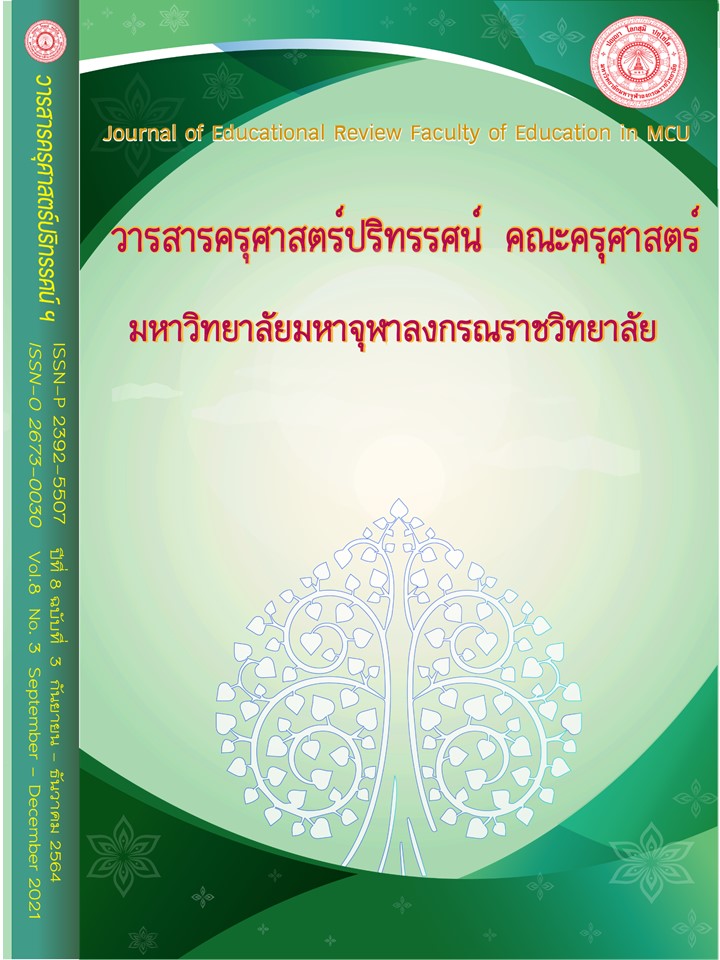POLICY IMPLEMENTATION OF REMEDIAL MEASUREMENT TO ASSIST SME’S BUSINESS AFFECTED BY THE COVID-19 SITUATION
Main Article Content
Abstract
The purpose of this research was to 1) to study the policy implementation of remedial measurement to assist the SMEs business affected by the COVID-19situation. and 2) to study the problems and obstacles in policy implementation of remedial measurement to assist the SMEs business affected by the COVID-19 situation. This research was qualitative by collecting from interviews with 18 key informants who wereexecutives in the public and private sectors involved in SMEs consisted of government policymakers, SME’s business association by purposive selection, the tools used for data collection were structured interviews. The results of the study concluded that: 1) Policy implementation of remedial measurement to assist the SMEs business affected by the COVID-19situation: (1) The deferral of principal and interest payments by Bank of Thailand: There was a policy for public financial institutions and private sector financial institutions to extend the period of deferring repayment of both principal and / or interest by not more than 6 months. (2) Soft loans: Bank of Thailand had allocated soft loans to private financial institutions to lend to SMEs. (3) Granting of new or additional credit through the state-owned financial institution by providing loans through financial institutions both government and private sectors, through various projects (4) The sound of the operator: There was a joint discussion between government agencies and the private sector on the direct and indirect impacts and barriers of the COVID-19 situation. (5) Speed in issuing measures to keep up with the situation: The government and Bank of Thailand had urgently issued measures in accordance with the Financial Aid Act to assist SMEs affected by COVID-19. (6) Maintaining continuity of measures during the affected period by extending time and extending the amount of measures to assist SMEs in deferring of principal payments, loans through under relentless conditions and releasing new credit to existing or new customers. (7) Cooperation between the public and private sectors in which the public and private sectors cooperated in proceeding with the postponement of principal and interest payments, loans through under relentless conditions, releasing new credit to existing or new customers (8) Problems and obstacles: Some operators were unable to borrow money from financial institutions, needed to borrow money outside the system until being cheated and being taken advantage of, and the rules and regulations were not consistent with the current situation and had many conditions, causing some operators to not receive assistance from government measures.
Article Details
ทัศนะและความคิดเห็นที่ปรากฏในบทความในวารสารฉบับนี้ถือเป็นความรับผิดชอบของผู้เขียนบทความนั้นเพียงผู้เดียว และไม่ถือเป็นทัศนะและความรับผิดชอบของกองบรรณาธิการ
กองบรรณาธิการขอสงวนสิทธิ์ในการคัดเลือกบทความลงตีพิมพ์และจะแจ้งให้เจ้าของบทความทราบหลังจากผู้ประเมินบทความตรวจอ่านบทความแล้ว
ต้นฉบับที่ได้รับการตีพิมพ์ในวารสารครุศาสตร์ปริทรรศน์ คณะครุศาสตร์ มหาวิทยาลัยมหาจุฬาลงกรณราชวิทยาลัย ถือเป็นกรรมสิทธิ์ของคณะครุศาสตร์ มหาวิทยาลัยมหาจุฬาลงกรณราชวิทยาลัย ห้ามนำข้อความทั้งหมดหรือบางส่วนไปพิมพ์ซ้ำ เว้นเสียแต่ว่าจะได้รับอนุญาตจากมหาวิทยาลัยฯ เป็นลายลักษณ์อักษร
References
ธนินท์รัฐ รัตนพงศ์ภิญโญ. (2561). กลยุทธ์การพัฒนาเพื่อความอยู่รอดและเติบโตของธุรกิจขนาดกลางและขนาดย่อม (SMEs) ในเขตจังหวัดเพชรบุรี. รายงานการวิจัย. มหาวิทยาลัยศิลปากร.
นิพนธ์ พัวพงศกร. (2563). การทบทวนโครงการใช้เงินกู้ 4 แสนล้าน เพื่อฟื้นฟูเศรษฐกิจและสังคมจากผลกระทบของโควิด-19. แหล่งที่มา https://www.prachachat.net/columns/news-548836#_ftn1. สืบค้นเมื่อ 29 มิ.ย. 2563.
ปฐมพร ทรงสุโรจน์. (2559). การศึกษาพฤติกรรมการกู้เงินของผู้ประกอบการ SMEs. วิทยานิพนธ์บริหารธุรกิจมหาบัณฑิต. มหาวิทยาลัยธรรมศาสตร์.
พิรญาณ์ เฉลยบุญ. (2559). การจัดการปัญหาธุรกิจและคุณภาพรายงานทางการเงิน ของธุรกิจ SMEs ในเขตภาคตะวันออก. วิทยานิพนธ์บริหารธุรกิจมหาบัณฑิต. มหาวิทยาลัยบูรพา.
ราชกิจจานุเบกษา. (2563). พระราชกำหนดการให้ความช่วยเหลือทางการเงินแก่ผู้ประกอบวิสาหกิจ ที่ได้รับผลกระทบจากการระบาดของโรคติดเชื้อไวรัสโคโรนา 2019. แหล่งที่มา http://www.oic.go.th/INFOCENTER2/ifunc_list.asp?i=SBFMD.343&b=1&t=@&d=ข้อมูลข่าวสารที่น่าสนใจ. สืบค้นเมื่อ 12 พ.ย. 2563.
ลัดดาวัลย์ เลขมาศ และแพรวพรรณ อินทรเกษม. (2562). แนวทางพัฒนาศักยภาพผู้ประกอบการ SMEs. วารสารวิชาการ มหาวิทยาลัยหอการค้าไทย มนุษยศาสตร์และสังคมศาสตร์. 39(2). 104-122.
วรเดช จันทรศร. (2548). ทฤษฎีการนำนโยบายสาธารณะไปปฏิบัติ. กรุงเทพมหานคร: สหายบล็อกและการพิมพ์.
สำนักงานสาธารณสุข. (2563). ไทยไม่พบผู้ติดเชื้อโควิดในประเทศ 35 วันติด ภาคเหนือตอนบน 8 จังหวัด ไม่พบติดต่อกัน 46 วัน. แหล่งที่มา https://region3.prd.go.th/region3_ci/topic/news/11609. สืบค้นเมื่อ 5 ก.ค. 2563.
สุรศักดิ์ อำนวยประวิทย์. (2559). กลยุทธ์การเข้าถึงแหล่งเงินทุนของผู้ประกอบการวิสาหกิจขนาดกลางและขนาดย่อมในเขตพื้นที่กรุงเทพมหานคร การเข้าถึงแหล่งเงินทุนของผู้ประกอบการ.วารสารวิชาการ RMUTT Global Business and Economics Review. 11(1). 1-14.


